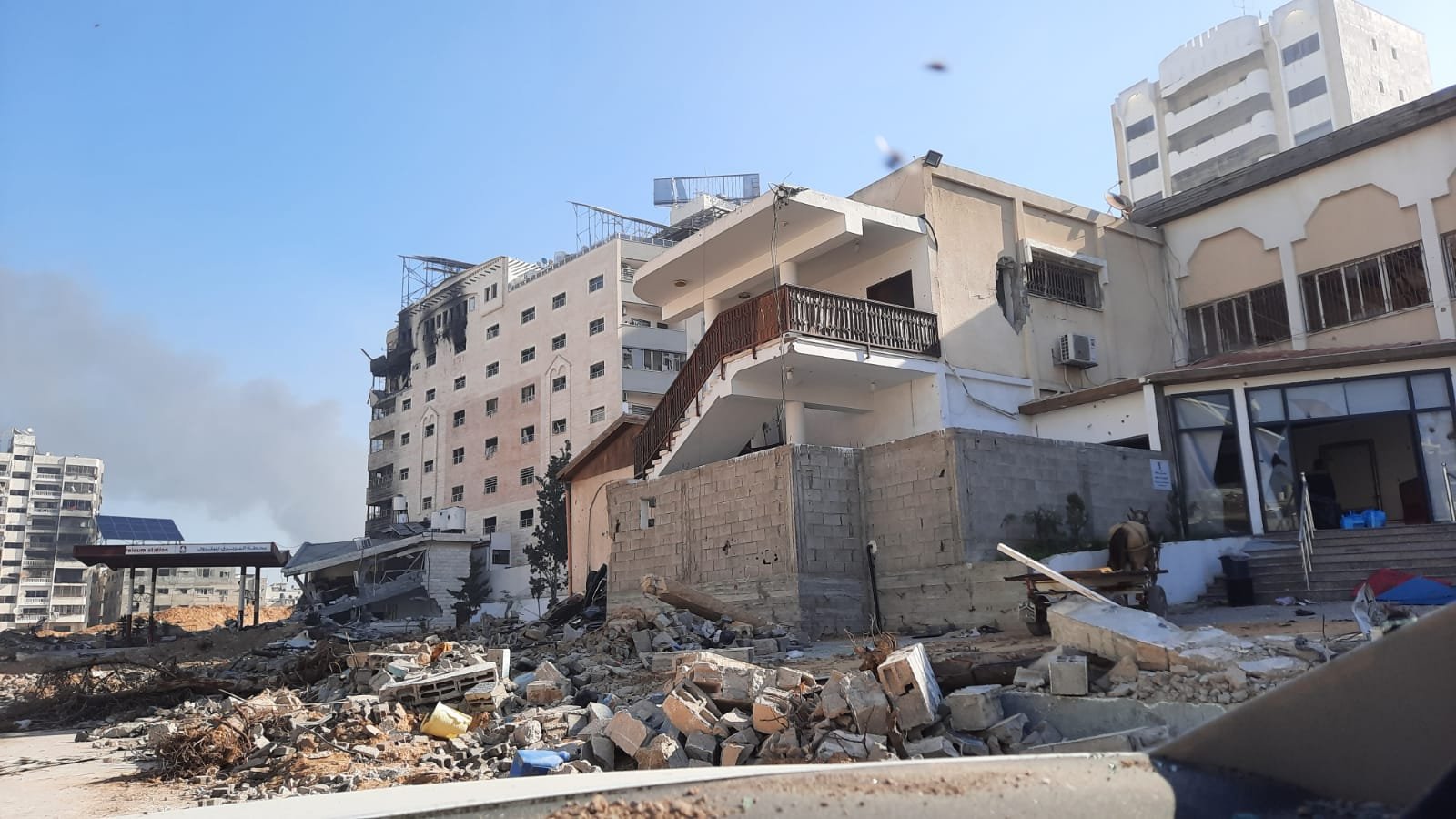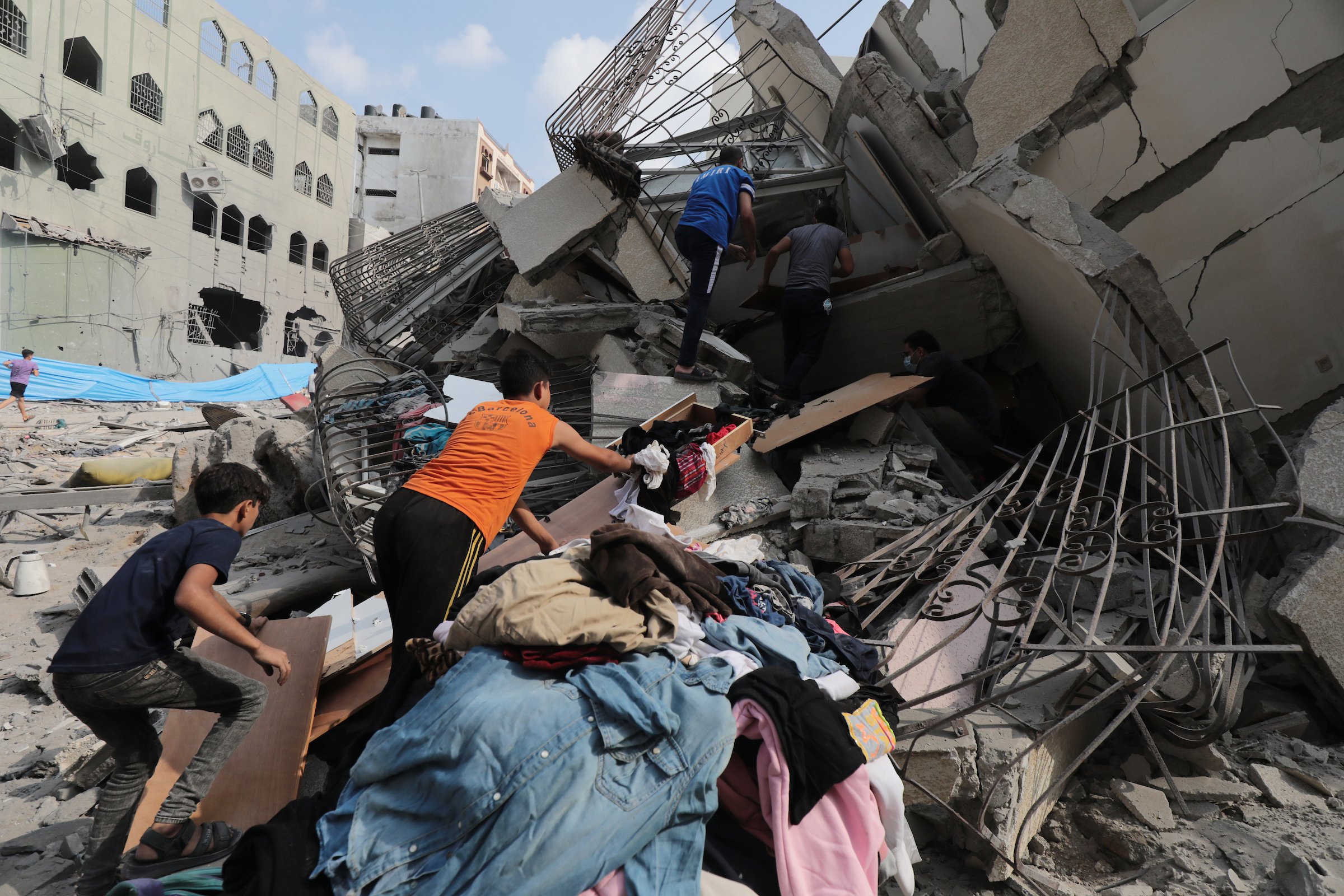War in Gaza: What should be our response?
December 2024
By Jamie Eyre, CEO of Embrace the Middle East
Two years ago this week was the last time I travelled to Gaza, a place I’ve visited eight or nine times since 2013.
Gaza YMCA in 2022.
Standing in the corner of the Gaza YMCA, at the time a haven for the Christian community, a friend pointed out the change in the backdrop. Looking at the back of the compound, something was missing. A multi-story apartment complex, which had previously cast a shadow over the YMCA’s basketball court, was gone, leaving a hole in the skyline.
One of the owners had, so the story goes, unbeknownst to his neighbours, sublet his apartment to some people involved with Hamas. In the August 2021 Israeli response to a volley of rockets, the residents of the building were warned to leave, and an airstrike destroyed the building. In that same outbreak of violence, the YMCA itself was damaged, and I remember the Director proudly walking us around the newly refurbished entrance when I visited a year later.
Looking back, I was naïve in my shock at a building being destroyed due to one tenant and a dozen or more innocent families, whose only error was to live alongside the wrong people, losing their homes. The story of that building and the families it played host to has now played out over the entire Gaza Strip on an epic scale, with 1.9 million people displaced and analysis suggesting that 70 per cent of Gaza housing stock is either damaged or destroyed.
Airstrike damage to the YMCA in Gaza in January 2024.
While the war in Gaza rumbles on – a seemingly endless intensification of destruction and violence – the fragile ceasefire north of the border is a welcome respite for displaced Lebanese families. We should pray that it is not short-lived.
Hussein, a Beirut-based friend who leads a school for deaf children, shared these words as his family surveyed the damage of 9 weeks of intense bombardment:
“Today, my sister’s family is leaving after staying in Beirut for nine weeks. They received the devastating news that their homes and their schools were destroyed. My family home is also completely gone. It’s incredibly painful to lose all our belongings, especially the heirlooms passed down from my parents, grandparents, and loved ones. My hometown has been wiped out, leaving nothing behind.
“My sister’s family will temporarily move to a rented house 25 kilometres from their hometown, where they will stay until a solution is found for rebuilding their home and schools for children with special needs.”
The impact of war on ordinary people, like Hussein’s family or my friends from Gaza YMCA, is nothing new. Every conflict has its innocents caught in the path of military might as it charges towards some imagined victory. But this does not mean we should sit silent, perhaps shocked at the impact, but quiet and timid in our response. The International Committee of the Red Cross (ICRC) pulls it into simple focus when explaining the rules of war, or what we know as international humanitarian law: “You do not attack civilians. You limit as much as you can the impact of your warfare on women and children, as well as on other civilians. You treat detainees humanely. You do not torture people.”
Read a little further, and ICRC notes that ‘every possible care’ should be taken to avoid harming civilians, their homes, or destroying their means of survival.
I am perhaps closer to the devastation in Gaza and Lebanon than most; I have many friends who live with the impact and consequences of war, and I have been a regular traveller to those lands in quieter times. I, too, watched in horror as Hamas and other militant groups killed, injured and took hostage more than 1,000 Israelis on October 7th 2023. The crimes committed that day are clear, and those responsible must be held accountable. This does not, however, mean that the rules of war should be suspended.
It is difficult to reconcile “limit as much as you can the impact of your warfare on women and children” with the images and stories we still hear daily coming from Gaza. The civilian population is paying a heavy price, a cost the Gaza population can ill afford, a cost I don’t believe we should accept.
Damaged and destroyed buildings in the Gaza Strip, 2024.
What is our role in this? As Christians, we are called to be peacemakers. I hear the cry of His Holiness Pope Francis: “Brothers and sisters, war is an illusion, it is a defeat: it will never lead to peace, it will never lead to security, it is a defeat for all, especially for those who believe themselves invincible. Stop, please!”
Whatever levers we have, whatever levers our government has, need to be pulled so that we all play our part in halting conflict and working towards sustainable peace. One such lever is suspending the export of arms.
As a significant international arms exporter, the UK government should pay heed to the rules of war and honestly ask ourselves what role our country plays in fuelling conflict versus limiting ‘as much as we can’ the impact of conflict on women and children. As one commentator recently put it, there is an “urgent need for governments to align arms trade policies with international humanitarian law. Providing components for weapons used in conflict zones risks implicating the UK in atrocities.”
As Advent begins, we remember the birth of the Prince of Peace, Jesus, the reconciler of man to God. More arms and violence are not the answer — Jesus’ example and the call from Christians across the Middle East are clear about this. We must encourage our leaders to work harder for justice and peace so that all who call the Middle East home can feel safe and thrive.
This blog was first published on the Church of England Newspaper website.
ADVENT NOT ARMS
A Parliamentary debate on arms sales to Israel is scheduled for Monday 16 December. Write to your MP before the debate to call the UK Government to suspend arms to Israel.




